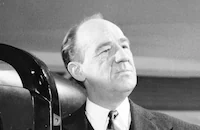The Beachcomber

Brief Synopsis
Cast & Crew
Muriel Box
Glynis Johns
Robert Newton
Donald Sinden
Paul Rogers
Donald Pleasence
Film Details
Technical Specs
Synopsis
Honorable Ted is a slovenly, bibulous South Sea Island beachcomber. The black sheep of a prominent British family, Ted is paid an annual salary to stay as far away from England as possible. Prim-and-proper missionary Martha, the sister of heathen-hating Welsh minister Owen, takes it upon herself to reform the intractable Ted. But soon, a hostile native tribe captures Martha, Owen and Ted and sentences them to a horrible death.
Director
Muriel Box
Cast

Glynis Johns

Robert Newton

Donald Sinden
Paul Rogers

Donald Pleasence
Walter Crisham

Michael Hordern
Auric Lorand

Anthony Quinn
Ah Chong Choy
Ronald Lewis
Jean Rollins
Lizabeth Rollins
Michael Mellinger
Film Details
Technical Specs
Articles
The Beachcomber
For the second movie version of The Beachcomber (1954), Robert Newton and Glynis Johns took over the lead roles. Newton was a fine British stage and screen star who appeared in a variety of genres but left his most enduring mark as Long John Silver in Treasure Island (1950), a role that he repeated in a sequel as well as an Australian TV series. He also was memorable as Bill Sikes in David Lean's Oliver Twist (1948). Like his character Ted in The Beachcomber, however, Newton had a serious drinking problem which led to his death at age 50 in 1956. Incidentally, Newton was also in the cast of Vessel of Wrath, playing the British Colonial Resident who is outraged by Ted's behavior.
The Beachcomber was written, produced and directed by the British husband-and-wife team of Sydney and Muriel Box, with Sydney writing and producing and Muriel directing. The pair had a long and fruitful career together in film and theater. Muriel began as a script girl in the 1920s before a successful playwriting stint with her husband, in which they churned out many one-act plays in the 1930s. In 1940, Sydney began producing a slew of wartime documentary films, and a few years later he and Muriel moved into writing narrative features. One of their first efforts won them an Academy Award for Best Screenplay: The Seventh Veil (1945) was produced by Sydney as an independent production and was a big success critically and commercially on both sides of the Atlantic. British mogul J. Arthur Rank was impressed enough to make Sydney the head of Gainsborough Studios. Later, the Boxes went back to making their own films together, with Muriel directing (she made her directorial debut in 1949); one of these was The Beachcomber. Muriel Box would direct 15 films over 15 years.
Upon The Beachcomber's 1955 U.S. release, The New York Times offered a positive review, though it compared the film unfavorably with the 1938 original: "It is merely a pleasant adventure and not the riotous jape its predecessor was... [It] does not have the hilarity, incisiveness and stature of the original... Muriel Box, who directed from her husband's script, has kept things moving at a gentle pace, but she has infused the proceedings with enough tropic charm - palm-studded beaches, blue and green lagoons and island people and customs - to give an observer the wanderlust. It is, in short, a lovely and colorful diversion."
Producers: Sydney Box, William MacQuitty
Director: Muriel Box
Screenplay: Sydney Box; W. Somerset Maugham (story)
Cinematography: Reginald Wyer
Art Direction: George Provis
Music: Francis Chagrin
Film Editing: Jean Barker
Cast: Glynis Johns (Martha Jones), Robert Newton (Edward Wilson "Honorable Ted"), Donald Sinden (Ewart Gray), Paul Rogers (Owen Jones), Donald Pleasence (Tromp), Walter Crisham (Vederala), Michael Hordern (The Headman), Auric Lorand (Alfred, Major Domo), Tony Quinn (Ship Captain), Ah Chong Choy (Wang the Barkeep), Ronald Lewis (Headman's Son).
BW-84m.
by Jeremy Arnold

The Beachcomber
Quotes
Trivia
Miscellaneous Notes
Released in United States Winter January 1955
Released in United States Winter January 1955














